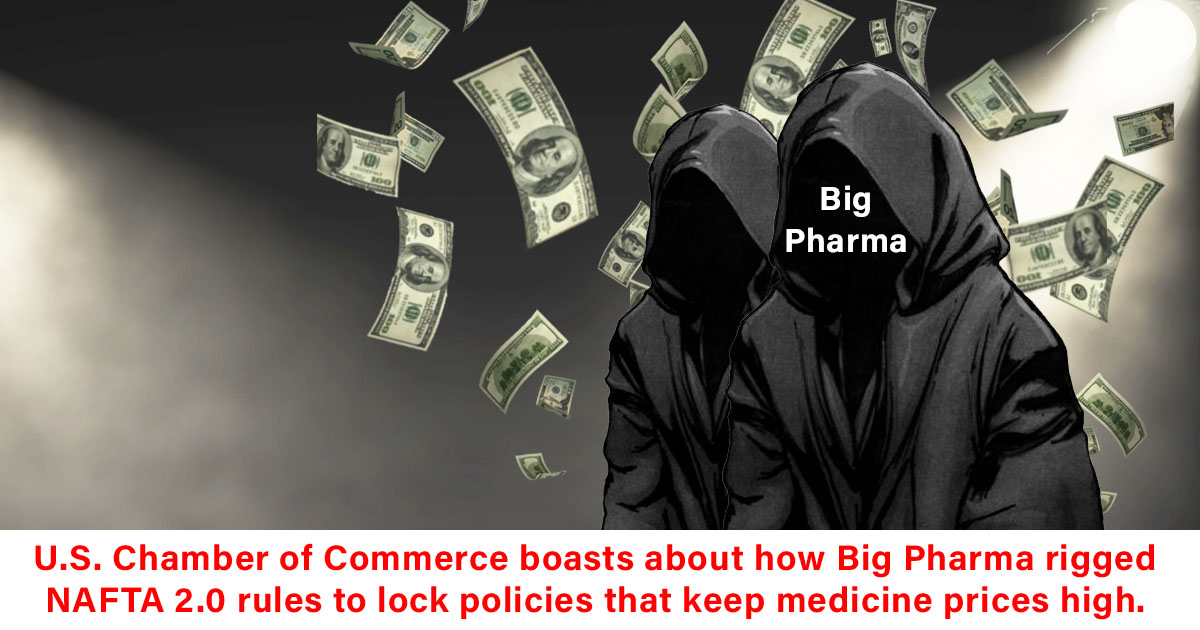Big Pharma Protections to Lock in High Medicine Prices Could Sink NAFTA 2.0
Public Citizen News / March-April 2019
By Melanie Foley

This article appeared in the March/April 2019 edition of Public Citizen News. Download the full edition here.
It’s no secret that the American public is united in fury about outrageously high medicine prices.
Soaring health care costs were the top issue for voters in the midterm elections. President Donald Trump repeatedly has made high-profile promises to lower prescription drug prices. Public Citizen has fought against Big Pharma’s greed for decades, including efforts to pass domestic policies to lower medicine prices and fighting to keep pharmaceutical firms from sneaking extra monopoly protections into “free trade” agreements.
But the renegotiated North American Free Trade Agreement (NAFTA) Trump signed at the end of last year guarantees extended monopoly rights for big pharmaceutical companies, enabling them to avoid generic competition and keep U.S. drug prices high.
Now, new Public Citizen opinion research conducted by renowned pollster Stan Greenberg reveals that Big Pharma’s success in rigging the revised NAFTA could prove to be the pact’s demise, unless it is revised to remove these terms.
To go into effect, the U.S. House of Representatives and Senate must approve the revised deal.
“The deal includes some essential improvements that progressives have long demanded,” said Lori Wallach, director of Public Citizen’s Global Trade Watch. “But more work is needed to ensure the deal includes strong labor and environmental standards that are subject to swift and certain enforcement. And, critically, the new powers for pharmaceutical firms that would keep medicine prices high must be removed. Absent this change, this and future Congresses would be limited in the reforms they can enact to bring down drug prices.”
That is because the revised NAFTA text requires signatory countries to provide pharmaceutical corporations expansive monopoly powers to block generic competition. Among other dangerous terms, NAFTA 2.0 requires governments to guarantee 10 years of special monopoly protections for biologic drugs. This would lock the United States into our bad policies that keep these medicines, including critical cancer treatments, out of reach for too many people and export our failed system to Mexico and Canada.
As Public Citizen pushes for the changes to NAFTA needed to stop its ongoing damage, the overwhelming takeaway from Greenberg’s research was voters’ visceral hatred of Big Pharma. As Greenberg noted, bringing up NAFTA’s giveaways to the pharmaceutical industry “was like throwing a bomb into the focus group.”
Focus group participants described pharmaceutical companies with words like “greedy,” “criminals” and “devils.”
The intensity of public concern about the NAFTA pharmaceutical provisions carried across all demographics and regions.
As Greenberg wrote: “The country is so frustrated with corporations — particularly the pharmaceutical companies that are killing them and the lobbyists and big money that rig the economy against them — that revealing any information about giveaways for these interests in NAFTA 2.0 drives voters to take action and fight back.”
The results of the polling, which Greenberg called “game changing,” made a splash in Washington policy circles after the Washington Post reported them.
Just after the poll was released, U.S. Rep. Earl Blumenauer (D-Ore.), chairman of the House Ways & Means subcommittee on trade, said, “I don’t think candidly that it passes out of my trade subcommittee” with the biologics provision intact.
Speaker Nancy Pelosi (D-Calif.) said Democratic concerns “center around workers’ rights, center on the environment, center around prescription drug prices.” She also remarked, “I have always thought that this was probably one of the easier trade agreements to come to agreement on, but, so far, we’re not there yet.”
Several Democrats noted the hypocrisy of Trump’s State of the Union speech, in which he promised to lower prescription drug pricing while urging Congress to pass his Pharma-rigged NAFTA deal.
Public Citizen recently led a group of more than 70 civil society organizations on a letter opposing the Big Pharma handouts in NAFTA 2.0. The diverse group included Consumer Reports, Doctors Without Borders, NETWORK Lobby for Catholic Social Justice, Social Security Works, Oxfam and AFL-CIO.
Meanwhile, the corporations that stand to benefit from the revised NAFTA proposal are mobilizing. According to a recent Axios report, two well-connected GOP operatives have just founded “Trade Works for America,” a lobby group aiming to win congressional support for Trump’s NAFTA rewrite. According to one of the founders, the group’s funding comes from “the pharmaceutical industry, oil and gas, the automotive and agricultural sectors, and traditional GOP donors.”
This NAFTA 2.0 text is not the transformational replacement of the corporate-rigged trade-pact model that Public Citizen and its allies have demanded. But, as Wallach noted, if we fight to get the Big Pharma giveaways out, swift and certain enforcement of improved labor and environmental standards in, and achieve some other key improvements, then the final package Congress likely will vote on in the first half of 2019 could stop some of NAFTA’s continuing, serious damage to people across North America.